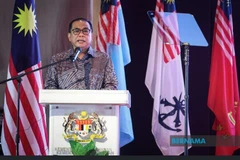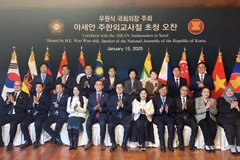Jakarta (VNA) - Since the start of the COVID-19 crisis, Bank Indonesia (BI) has been strengthening its policy mix to stabilise the rupiah, control inflation, support financial system stability and prevent a further decline in economic activities.
BI Governor Perry Warjiyo revealed in a recent meeting that the central bank's policy mix contains six essential points.
The first is to lower its seven-day reverse repo rate twice by 25 basis points to 4.5 percent.
The second is to stabilise and strengthen the rupiah by intensifying interventions in the spot market, domestic non-delivery forward market and by buying bonds in the secondary market, he said.
The BI has also established bilateral swap and repo line cooperations with several central banks in other countries, including the US and China.
The third point in the policy mix has Bank Indonesia continuing to expand instruments and transactions in the money and foreign exchange markets by providing more hedging instruments against the rupiah through domestic non-delivery forward transactions, increasing foreign currency swap transactions and providing term repo for banking needs.
The fourth point has the central bank injecting massive quantitative easing into the financial market and banks to encourage financing for businesses and kickstart a recovery of the national economy.
The fifth in the policy mix is to release macro-prudential policies to encourage banks to finance businesses through reducing loan-to-value ratio provisions, macroprudential intermediation ratio (RIM) and lowering the rupiah statutory reserve requirement for business financing – especially for export-import operators and MSMEs – to counter the impact of the coronavirus crisis.
To ease payment constraints for both cash and non-cash payment systems to encourage more economic and financial transactions is the last point./.





























